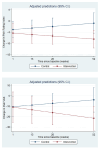Transvenous occlusion of incompetent pelvic veins to treat chronic pelvic pain in women: A randomised controlled trial
- PMID: 37095614
- PMCID: PMC7616997
- DOI: 10.1111/1471-0528.17512
Transvenous occlusion of incompetent pelvic veins to treat chronic pelvic pain in women: A randomised controlled trial
Abstract
Objective: To investigate the effectiveness of transvenous occlusion of incompetent pelvic veins in women presenting with chronic pelvic pain (CPP) in improving symptoms and quality of life.
Design: Patient-blinded randomised controlled trial with objective outcome measures. Results were analysed on an intention-to-treat basis.
Setting: Gynaecology and Vascular Surgery Services of two teaching hospitals in northwest England.
Population: Sixty women aged 18-54 years presenting with CPP after exclusion of other pathology, and who were found to have pelvic vein incompetence.
Methods: Participants were randomised and assigned to contrast venography alone or contrast venography plus transvenous occlusion of the incompetent pelvic veins.
Main outcome measure: The primary outcome was change in pain score measured using the short-form McGill Pain Score (SF-MPQ) and the Visual Analogue Score (VAS) recorded at 12 months post-randomisation. Secondary outcomes included quality of life using the EQ-5D instrument, symptomatic improvement and procedure-related complications.
Results: Sixty participants were randomised to transvenous occlusion of incompetent pelvic veins or venography only. At 12 months, median pain scored 2 (3-10) in the intervention group versus 9 (5-22) in controls (p = 0.016). Pain on the VAS scored 15 (0-3) versus 53 (20-71), respectively (p = 0.002). Median EQ-5D improved after intervention from 0.79 (0.74-0.84) to 0.84 (0.79-1.00; p = 0.008) over 12 months. No major complications were reported.
Conclusion: Transvenous occlusion of pelvic vein incompetence reduced pain scores, improved quality of life and diminished symptom burden with no major reported complications.
Trial registration: ISRCTN 15091500.
Keywords: pelvic pain; randomised controlled trials.
© 2023 The Authors. BJOG: An International Journal of Obstetrics and Gynaecology published by John Wiley & Sons Ltd.
Conflict of interest statement
None declared.
Figures
References
-
- Moore SJ, Kennedy SH. Royal College of obstetrics and Gynaecology green-top guideline: the initial management of chronic pelvic pain. London: RCOG; 2012.
-
- Zondervan KT, Yudkin PL, Vessey MP, Dawes MG, Barlow DH, Kennedy SH. Prevalence and incidence of chronic pelvic pain in primary care: evidence form a national general practice database. BJOG. 1999;106:1149–55. - PubMed
-
- Lamvu G, Carrillo J, Ouyang C, Rapkin A. Chronic pelvic pain in women: a review. JAMA. 2021;325(23):2381–91. - PubMed
-
- Howard FM. The role of laparoscopy in chronic pelvic pain: promise and pitfalls. Obstet Gynecol Surv. 1993;48(6):357–87. - PubMed
-
- Daniels JP, Khan KS. Chronic pelvic pain in women. BMJ. 2010;341:c4834. - PubMed
Publication types
MeSH terms
Grants and funding
LinkOut - more resources
Full Text Sources



